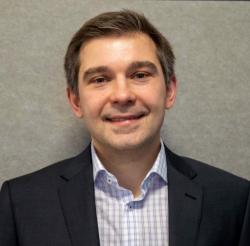Dr Stas Shabala, 2022–23
Dr Stas Shabala
Stas is a theoretical astrophysicist. Since obtaining his PhD from Cambridge University, he has spent the past decade building computer models describing galaxies and black holes then confronting them with telescope observations to test our understanding of the Universe. Stas is an experienced university physics teacher and a passionate advocate for the importance of STEM in our society.
What were you researching before you started as a Science Policy Fellow?
My research expertise is in theoretical astrophysics, developing fluid dynamical models that describe the interactions between black holes and the galaxies in which they reside. The sky is full of extreme environments which we cannot recreate on Earth; my colleagues and I use these to test our understanding of nature’s laws. Together, models and observations allow us to rule in or out new laws of physics. To do this, we use some of the world’s best supercomputers.
How has your research background helped you contribute to policy development?
Critical thinking, cross-checking evidence with a dose of healthy scepticism, and being comfortable with leading projects are all research skills that translate well to policy work. Scientists are inherently comfortable with not having complete answers to a question and the process of learning new things; both of these were very handy in the early days! Being honest about knowns and unknowns is a must in policy, and science provides a good background in doing that. As in good science teams, the policy process is iterative; I think that my experience in providing and receiving feedback from research team members has made me a better contributor to policy.
How has the program changed your career aspirations?
As a university academic, I was acutely aware that the resources available to do the two things I was passionate about – teaching and research – were largely determined by government decisions. I applied for the Fellowship because I wanted to understand the world of policy, and the drivers behind decisions that affect all Australians. I discovered that my colleagues, both at universities and in the public service, have similar long-term goals – but they speak different languages. Science Policy Fellowships bridge this gap and allow us to glean insights into “the other world”.
I will be returning back to my university position at the end of the Fellowship. With experience in both worlds, my aim is to be an interpreter between them.
What is your favourite part about working in a policy role in the Australian Public Service?
The two stand-out aspects of working in the APS are teamwork and the opportunity to make tangible contributions to improving people’s lives. I was fortunate to contribute to several policy areas which I really care about, primarily in education and research. Best of all, I have worked with many incredible people, each of whom I have tried to learn from. I am still blown away by how collaborative my APS colleagues have been. The focus is genuinely on delivering high-quality advice, rather than worrying about who gets the credit. This engenders a culture of teamwork that I will attempt to re-create in my own academic work.

